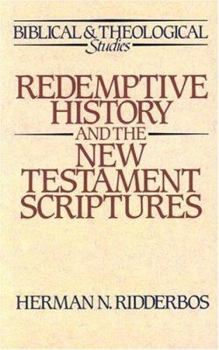Redemptive History and the New Testament Scriptures
An investigation of the New Testament canon and how it fits into redemptive history.
Format:Paperback
Language:English
ISBN:0875524168
ISBN13:9780875524160
Release Date:June 1988
Publisher:P & R Publishing
Length:104 Pages
Weight:0.61 lbs.
Dimensions:0.3" x 5.4" x 8.5"
Customer Reviews
2 ratings
Canon: The Only Rule Of Faith And Practice
Published by Thriftbooks.com User , 17 years ago
'That the canon was formed after a long ecclesiastical development is not necessarily incompatible with the special authority that the church has ascribed to it.' p 3 The apostolic developments in early church history are profound and Ridderbos captured the essence of the apostles' desire to create the church in response to Christ's demand of faithfulness to the apostolic task. The early church perpetuated this emphasis on the original apostolic eyewitness, and Ridderbos contributed historical fact when he deduced the three initial forms of proclamation in kerygma, marturia and didache. Ridderbos drew from his many years of experience as a Professor of New Testament to extract an exact understanding in the relation between the received tradition and the later formation of the NT canon. He also sought to provide responsible scholarship recourse to a learned apologetic that would complement BB Warfield's concept of the 'concursive' operation of both the Holy Spirit and the human authors in the formation of the NT canon. He briefly traced the new views of Scripture which had their existence just prior to the 1900s and so denounced textual criticism that sought to repudiate Scripture's origin. Developments of thought from German schools where ideas opposed to, or not in accordance with the Holy Scriptures, were born, were all processes meant to cast doubt on the formation of the canon. Inspiration, as held by the best theologians, had undergone heavy and sustained attacks from liberal critics who took in so many through their revisionist biblical history. 'It is evident, then, that the NT itself inseparably unites the central events of redemption on the one hand and their announcement and transmission on the other. The announcement of redemption cannot be separated from the history of redemption itself. That proclamation was left neither to chance, nor to human tradition or reporting nor to preaching, whether of religiously gifted individuals or of the church.' p 15 'This emphasis on the written Scriptures as themselves the product of a divine activity, making them as such the divine voice to us, is characteristic of the whole treatment of Scripture by Paul (Rom 4:23, 15:4; 1 Cor 4:6, 9:10; 1 Cor 10:11).' BB Warfield, The Inspiration and Authority of the Bible p 318 Defining the Holy Scripture's divine origin and how it gained its historical authority apart from apostolic tradition, Ridderbos asserted the essential understanding that 'Those developments are not simply deduced a posteriori from the subsequent historical facts. The NT itself indicates that the apostolic tradition was intentionally given in a written form so that it could be accurately preserved. 1 Cor 15 is such a passage. There Paul extensively and intentionally establishes the apostolic tradition about Jesus' resurrection by putting it in writing. He has not written anything new (vs. 1). His concern is that the church retains the tradition in the words which he had proclaimed i
Essential Protestant Teaching
Published by Thriftbooks.com User , 27 years ago
This thin and razor sharp piece of scholarship is essential to the understanding and defense of true protestant religion. Too many so-called protestants don't know the first thing about "Sola Scriptura." And among the slightly aware, canonicity is a much neglected topic. Get a life and read this book today.





